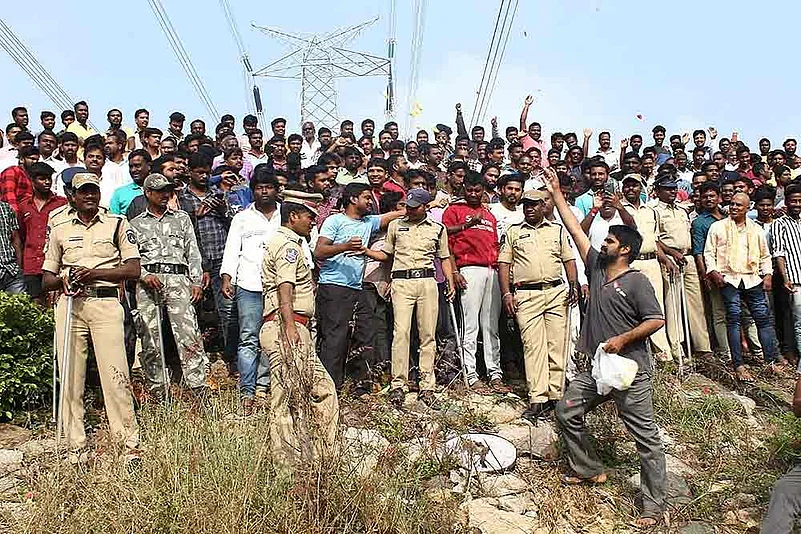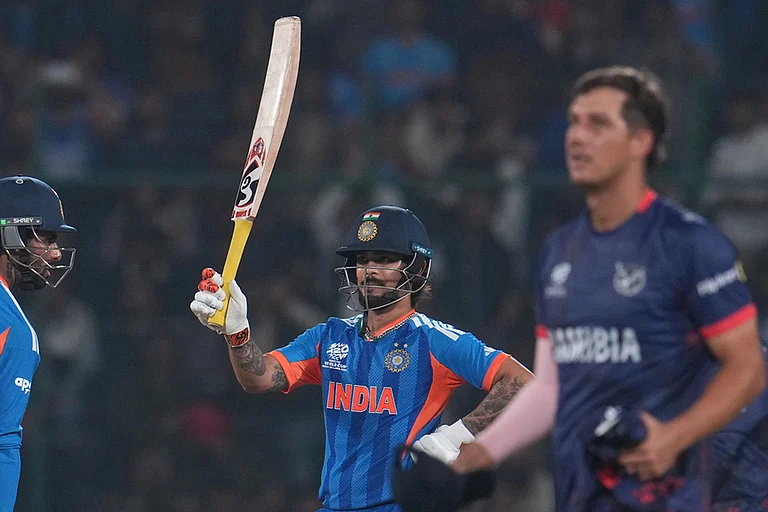The recent shooting of gangster Vikas Dubey by the UP Police, a day after he had dramatically surrendered in Ujjain, has once again brought the issue of extrajudicial killings by police in India to the fore. Several disturbing questions have been raised about the police story and, in the absence of convincing answers, there are reasons to believe that it was yet another case of extrajudicial killing. The story in almost all such cases remains the same, that the accused tried to flee or fired at the police, and had to be killed. In December 2019, all the four accused in the kidnapping, rape and murder of a young woman ‘Disha’ were killed by the police in Hyderabad. To make it look like a case of having dispensed poetic justice, they were killed at exactly the same place where they had committed the horrible crime.
The disturbing thing is that a large number of people strongly approve of meting out instant justice. In the Disha case, slogans were shouted praising police and flowers were showered upon them. In other cases also, there have been a barrage of congratulatory messages on social media. Most of such people claim that they are exasperated by our judicial process being very slow and the chances of the accused getting acquittal being rather high.
Even as many people find them gratifying, extrajudicial killing of criminals are utterly illegal—even if they were accused of the most dastardly crimes. In 2014, in the case of Prakash Kadam & Etc. Etc vs Ramprasad Vishwanath Gupta & Anr, the Supreme Court had held that fake ‘encounters’ are nothing but cold-blooded, brutal murder by persons who are supposed to uphold the law. The SC said that in cases where a fake encounter is proved against policemen in a trial, they must be given death sentence, treating it as the rarest of rare cases. The Court also warned the policemen that they will not be excused for committing murder in the name of ‘encounter’ on the pretext that they were carrying out the orders of their superior officers or politicians, however high.
One of the stock pleas of the policemen is that they were ordered by their superiors to do so. Reacting to this, the SC held, “If a policeman is given an illegal order by any superior to do a fake ‘encounter’, it is his duty to refuse to carry out such illegal order, otherwise he will be charged for murder, and if found guilty sentenced to death. The ‘encounter’ philosophy is a criminal philosophy, and all policemen must know this. Trigger-happy policemen who think they can kill people in the name of ‘encounter’ and get away with it should know that the gallows await them.”
Three months later, the Supreme Court ordered immediate arrest of two senior Rajasthan police officers in the alleged fake encounter killing of Dara Singh, who according to the state government’s claim was a “dreaded gangster”. The court said, “Police personnel as custodians of law are expected to protect people and not eliminate them as contract killers”.
In areas affected by insurgency and terrorism, there have been a large number of extrajudicial killings, all in the name of combating terrorism. On July 8, 2016, the Supreme Court delivered an interim judgment on a petition filed by the Extra Judicial Execution Victim Families Association, seeking a detailed investigation into 1,528 documented cases of alleged fake encounters in Manipur wherein the Armed Forces (Special Powers) Act was ostensibly abused to facilitate the killings.
The attorney general sought to fend it off by arguing that excessive inquiries into allegations of fake encounters could demoralise security forces, forcing them to battle insurgents with “one hand tied behind their backs”. The court rejected the argument and held that it was not the encounter or the (military/police) operation that was under scrutiny but the ‘smoking gun’ that was under scrutiny. The SC was clear that if the security forces have been deployed for an indeterminate period of time, then there clearly has been a systemic failure in governance.
To make the matter further clear, the SC said, “If members of our armed forces are deployed and employed to kill citizens of our country on the mere allegation or suspicion that they are the ‘enemy’ not only the rule of law, but our democracy would be in grave danger”.
The final orders in the Extra Judicial Execution Victim Families Association vs Union Of India And Ors. came on July 14, 2017. The Supreme Court ordered a CBI investigation into 98 fake encounter killings in Manipur in the last decade, to be conducted by a Special Investigation Team. Relying upon the judgment of a Constitution Bench in the case of Naga People’s Movement of Human Rights vs Union Of India, the SC held that an allegation of use of excessive force or retaliatory force by uniformed personnel resulting in the death of any person necessitates a thorough enquiry into the incident.
The court was emphatic that if a crime had been committed, which involved the death of a person who was possibly innocent; it could not be overlooked merely because it happened a long time ago.
In February 2009, a five-Judge Bench of the Andhra Pradesh High Court, in the case of AP Civil Liberties Committee (APCLC) vs State of AP, ruled that if a police officer or some other public official, caused death of a person, the information relating to such circumstance should be registered as an FIR. It does not matter whether he acted or purported to act in discharge of his official duties or acted in self-defence, as the case could be.
In view of the fact that police encounters are likely to continue to take place, and some of them could be genuine also, in 2014, the Supreme Court, in the case of People’s Union for Civil Liberties vs State of Maharashtra & Ors, prescribed a set of 16-point guidelines. Alert citizens and human rights groups must watch whether the prescribed procedure is being followed in each case or not.
The judgment of the APHC mentioned above was challenged by the AP Police Officers’ Association in the Supreme Court. It was decided only in July 2019. In the case of AP Police Officers’ Association vs AP Civil Liberties Committee, the Supreme Court ruled that the judgment in the case of People’s Union for Civil Liberties would hold the field in the matter of investigating police encounters.
However, that offers little solace to the families of the victims, because they would have lost their loved ones anyway. Our endeavour must be to put an end to this abominable practice. The very fact that we are obliged to write and talk about extrajudicial killings is, by itself, extremely worrisome. In any civilized society, it should be unimaginable that the agencies of the state would be so lawless as to kill citizens in cold blood without following the due process of law. It is not just a mockery of justice, it strikes at the very roots of everything that upholds a civilised society. The simple reason is that the practice, if condoned or even tolerated, is fraught with the dangers of rampant abuse. The police or the army could kill anybody and claim that he had fired at them and they fired in return. Evidence can always be manipulated.
Granted that the judicial process is slow, but this is what the nation has given to itself. What has prevented the nation from enacting new Acts replacing the Indian Penal Code and Code of Criminal Procedure, etc. which were enacted back in 1860 and 1898 respectively? If the people felt that the judicial system was not able to deliver satisfactory service, why did they not mount pressure on their elected representatives during the 73 years following independence for enacting new legislations that could deliver speedier justice? Was it not their responsibility too? The public cannot abdicate its responsibility of asking for systemic reforms in the judicial system and still claim that it has a ‘right’ to adopt illegal means to supposedly address the shortcomings of the judicial system. Fact is it is their primeval bloodlust, which they seek to satisfy vicariously through extrajudicial killings.
A retired IPS officer, he is a former Director General of Police in Kerala (Views expressed are personal)





















